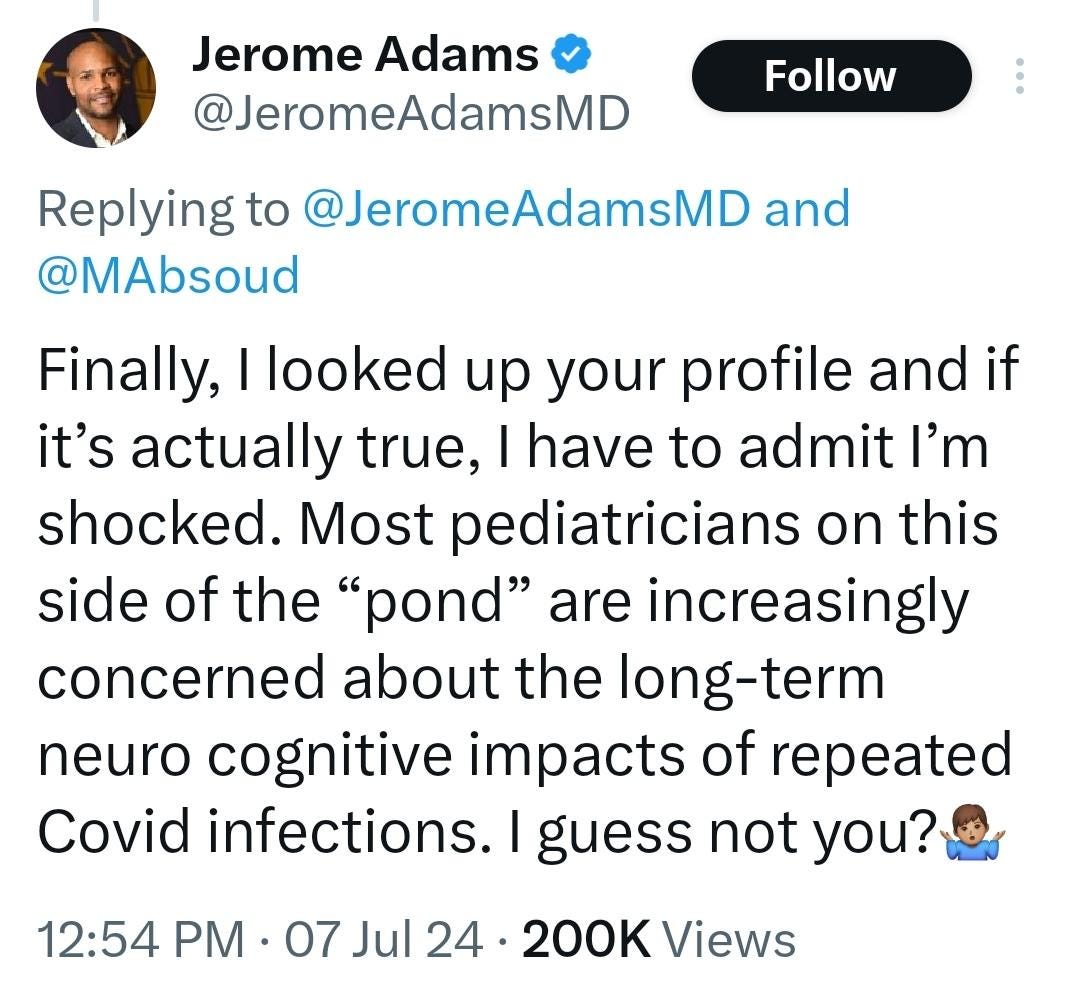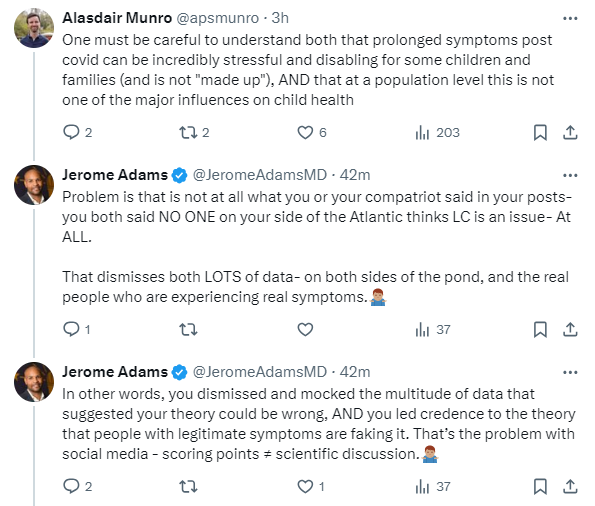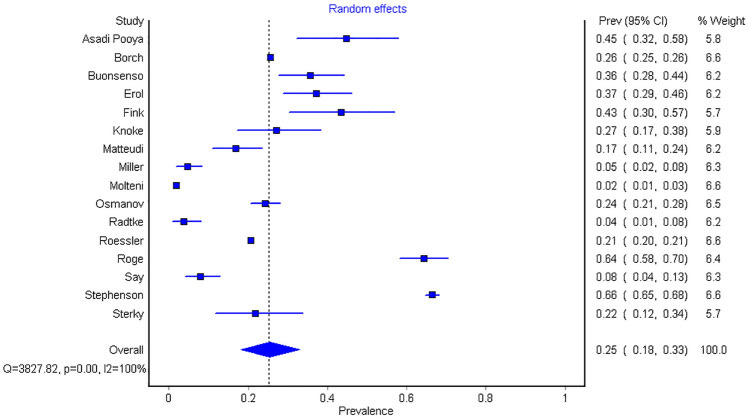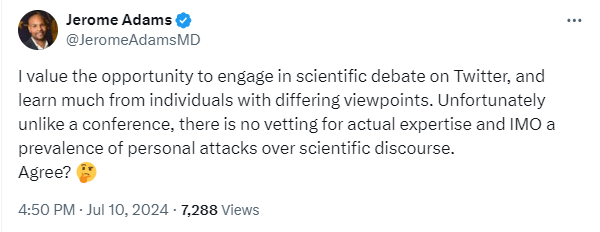Long Covid in Children
Former Surgeon General, Jerome Adams, makes shocking claim that "most" American pediatricians are concerned about cognitive impacts from repeated infections
While most doctors have moved on from Covid being a major concern, Jerome Adams, the former US Surgeon General, has not. He often tweets about Covid advocacy, frequently promoting his pandemic book, Crisis and Chaos. Recently, he re-shared an excerpt from his book about school reopening during Covid, in which he claims that reopening advocacy was about “deliberately infecting the kids” to achieve herd immunity. In his retweet, he added the excuse that “many wanted schools open not for the kids- but so they could get the parents back to work.”
There were many different arguments made in favor of school reopening — schools are important to children, families, and society at large for many reasons. We knew that children were being harmed by long-term school closures, that kids were among the least at risk from Covid, and that schools could reopen safely without driving spread in the community. As a vocal school reopening advocate myself, I could write a whole article on this, but it hardly seems necessary now that most experts readily acknowledge that long-term school closures were a failed policy that should never be repeated.
But debate over his tweets about school reopening led Dr. Adams to make a fairly outrageous claim about children and Long Covid that I think needs to be addressed, given his position as former Surgeon General, and the complete lack of evidence supporting his assertion. He claimed that most US pediatricians “are increasingly concerned about the long-term neuro cognitive impacts of repeated Covid infections.” And he bullied and maligned doctors who dared disagree with him, much like he bullied me in the past when I debunked a pre-print and CDC presentation that falsely claimed that Covid was a top five cause of death for children.
He also made the strawman argument that the UK doctors who pushed back on his claims were saying that Long Covid isn’t an issue “AT ALL.” (As usual with Covid discourse, nuance is completely dead.)
I want to be clear — those disputing Dr. Adams’ claim are not saying that children are never affected by post-Covid health issues. They are just suggesting that those issues are not substantially different than post-viral issues from flu or RSV or other illnesses.
One of the claims Dr. Adams keeps repeating is that most Long Covid results from mild infections. This is true, but only because the vast majority of Covid infections are mild, so even a small percentage of those cases adds up. It is well-established that severity of acute infection is a strong risk factor for post-Covid conditions, and it is also well-known that Covid infections are typically more mild in children.
Evaluating the Evidence
In an attempt to back up his claims, Dr. Adams shared several links to articles and studies about Long Covid and kids. I have gone through his articles and studies one-by-one to show that they do not, in fact, support his assertion that Long Covid in kids is a growing concern among US pediatricians.
“Millions of US Children Experience Range of Long COVID Effects”
(JAMA Medical News in Brief, February 2024)
I do not have full access to this full article because it’s behind a paywall, but it appears to be just a JAMA news summary of a narrative review that was published in Pediatrics, the journal of the American Academy of Pediatrics (AAP). Another AAP paper about quality evidence states that narrative reviews are different from systematic reviews and can be “susceptible to selection bias through omission of key studies or bias from emphasis of results produced by flawed methods.” The AAP narrative review on Long Covid includes the following claim:
“Given that ∼20% of COVID cases in the United States are in children, and that current pediatric postacute sequelae of SARS CoV-2 (PASC) prevalence estimates are 10% to 20%, PASC is estimated to affect up to 5.8 million children, representing a significant community impact.”
This is a very questionable estimate based on a weak understanding of the data, which I have tweeted about before. It was also criticized by biologist David Wessner in Forbes, who noted, “it’s unclear how the authors determined that 10-20% of children with Covid-19 will develop long Covid.” He also noted that Dr. Suchitra Rao and some of the other authors of the current Pediatrics review previously published a study in JAMA that concluded, “PASC in children appears to be uncommon.” (PASC, post-acute sequelae of SARS-CoV-2, is another name for Long Covid.)
In addition, Dr. Melissa Stockwell, one of the lead authors on the narrative review was interviewed for The Sick Times, in which she stated that part of the reason for the paper was that “pediatricians just don’t know about this [Long Covid in kids].” That seems to be evidence that most US pediatricians are not, in fact, concerned about post-Covid impact in kids, directly contradicting Dr. Adams’ claim.
Battling long COVID: Pediatricians talk strategies, prevention measures for children with lingering symptoms
(AAP News, April 2023)
This is a news article featuring a Long Covid advocate, Dr. Amy Edwards, who founded and is now the Director of the Pediatric COVID Recovery Clinic at UH Rainbow Babies & Children’s Hospital. Of course doctors who run Long Covid clinics see a lot of Long Covid patients, but that doesn’t tell us much. The theme of this article, and much of Dr. Edward’s advocacy, is about increasing awareness that children can get Long Covid. This is not disputed by those who disagreed with Dr. Adams, and again, the need for an awareness campaign seems to be evidence that most pediatricians are not especially concerned about post-Covid impact in kids.
Long-COVID in children and adolescents: a systematic review and meta-analyses
(Scientific Reports, June 2022)
Dr. Adams claimed this systematic review was published in Nature (a prestigious journal), but it was actually published in Scientific Reports, an open-access journal launched by Nature.
This paper is from Dr. Sandra Lopez-Leon, another Long Covid researcher. I previously critiqued a flawed systematic review she did on Long Covid in adults that estimated an unrealistic Long Covid prevalence of 80%, so I approached her systematic review on pediatric Long Covid with similar level of skepticism.
This review and meta-analysis of Long Covid in kids found a prevalence of 25.24% in children, but it is skewed by a few anomalous studies that were included in the analysis that showed very high prevalence:
Stephenson found 66% prevalence of symptoms in UK children after 3 months in the Covid-19 group, but also found 53% of the control group had symptoms at three months. The Lancet also published a detailed response to this paper that points out some additional issues with these findings.
Roge found 70% Long Covid prevalence in Latvia (inexplicably listed as 64% in the systematic review), but it was performed at a hospital with a pediatric Long Covid clinic. Study participants applied for “an in-depth evaluation and long-term medical surveillance after SARS-CoV-2 infection” or were referred to the hospital’s services by doctors. This greatly skews the study cohort toward children who were experiencing Long Covid symptoms.
Asadi-Pooya found 45% prevalence of Long Covid, among a small cohort of children hospitalized for Covid in Iran in 2020. 31% of those who reported Long Covid were admitted to the ICU during their hospital stay.
Fink found 43% prevalence of Long Covid among a small cohort in Brazil, but 83% had a pre-existing immunosuppressive condition, and 38% were hospitalized during the acute phase of Covid.
These four studies clearly skewed the prevalence higher, and there were several additional studies in the analysis that only included hospitalized patients. Confounders and biases like these make any prevalence estimates from this data worthless.
Not 'little adults': Experts say long COVID undercounted, misdiagnosed in kids
(CIDRAP, October 2023)
This is an article in CIDRAP, a publication that has repeatedly posted misleading and inaccurate claims about Covid, particularly about Long Covid and about children. This article is based not on a specific study, but on the overall topic of kids and Covid, based on interviews with three Long Covid activists — two researchers, David Putrino and Ziyad Al-Aly, plus Hannah Davis, the cofounder of the Long Covid advocacy group Patient-Led Research Collaborative. This is clearly an advocacy piece, not an unbiased assessment that represents the majority opinion on Long Covid in children.
Putrino is a Long Covid researcher and activist, who is well known for making outrageous and unsupported Long Covid claims. During his recent appearance on NewsNation with Chris Cuomo, he claimed without evidence that “there is no such thing as a mild SARS-CoV-2 infection. There is no such thing as a SARS-CoV-2 infection that does not have prolonged consequences.” Al-Aly is another high-profile Long Covid researcher and outspoken activist, who has spent the last four years publishing Long Covid studies based on electronic health records from the Veterans Affairs system. EHR data is prone to coding issues, plus this is a cohort of mostly older men, so the findings cannot be generalized to the wider US population, much less the pediatric population. Both of these researchers are incentivized to exaggerate Long Covid prevalence in order to advocate for more grant money for Long Covid research — because that’s what funds their work.
The reality of pediatric long COVID
(APA Monitor on Psychology, April 2023)
Finally, this article in the magazine of the American Psychological Association (APA) is an overview of pediatric Long Covid that examines how psychologists can help treat it and calls for more research. It doesn’t include any evidence of widespread concern among pediatricians over cognitive impacts. The article, written by a freelance journalist, says the following about Long Covid prevalence:
“Even calculating the prevalence of the syndrome in children has been a challenge. Early estimates ranged from 4% to 66% of those infected with the virus, but recent calculations fall closer to 10% (Zimmermann, P., et al., The Pediatric Infectious Disease Journal, Vol. 40, No. 12, 2021; Radtke, T., et al., JAMA, Vol. 326, No. 9, 2021).”
It is unclear where this article’s 10% estimate comes from. The 4-66% range mentioned comes from the Zimmermann paper that is cited, which noted major limitations in the underlying Long Covid studies, including poor case definitions, lack of control groups to distinguish symptoms caused by infection versus those causes by other aspects of the pandemic, and selection bias due to low response rate.
“In summary, the evidence for long COVID in children and adolescents is limited, and all studies to date have substantial limitations or do not show a difference between children who had been infected by SARS-CoV-2 and those who were not. The absence of a control group in the majority of studies makes it difficult to separate symptoms attributable to long COVID from pandemic-associated symptoms.” (Zimmermann et al., 2021)
The Radtke study that she cited reported very low prevalence of Long Covid in children, with 4% of seropositive children versus 2% of seronegative children reporting 1 or more symptoms that lasted longer than 12 weeks. So it is not clear how the author concluded that recent data was coalescing around a 10% prevalence of pediatric Long Covid.
Final Thoughts…
Dr. Jerome Adams, an anesthesiologist and the former US Surgeon General, would like to believe that he speaks for most US pediatricians, but in reality, he is listening to the most extreme Long Covid advocates and assuming that is a baseline for most American doctors. The studies and articles he linked are evidence that pediatric Long Covid exists and is important to study, but do not support his assertion that the cognitive impacts of repeat infections are a growing concern among the majority of US pediatricians.
Dr. Adams took any opposition as Long Covid denialism instead of carefully listening to what pediatric specialists from the UK and US were telling him. He seemed to assume the worst about anyone who disagrees, arguing that they were dismissive, uninformed, disrespectful, and uninterested in scientific discussion. However, I’d suggest that’s a description of his own tweets on this topic over the past several days. He even accused Dr. Mark Lindsay, a pediatric cardiologist at Massachusetts General, of having Long Covid cognitive impairment — simply for stating the obvious truth that most US pediatricians are not concerned about neuro cognitive issues stemming from repeat Covid-19 infections in children.
I would urge Dr. Adams to do some introspection on his beliefs about pediatric Long Covid, as well as his behavior with other doctors and scientists. He points the finger at others, but doesn’t seem to recognize his own recent behavior on Twitter was of a doctor engaging respectfully and learning from others with differing viewpoints and pediatric expertise. He jumped right to attacks instead of scientific discourse. Hopefully he will take the time to read this article and consider that his perspective on Long Covid and kids might be skewed by a few vocal activists, and is not representative of the concerns of most doctors. Everyone who disagrees with him should not be treated like a brain-damaged science denier.






